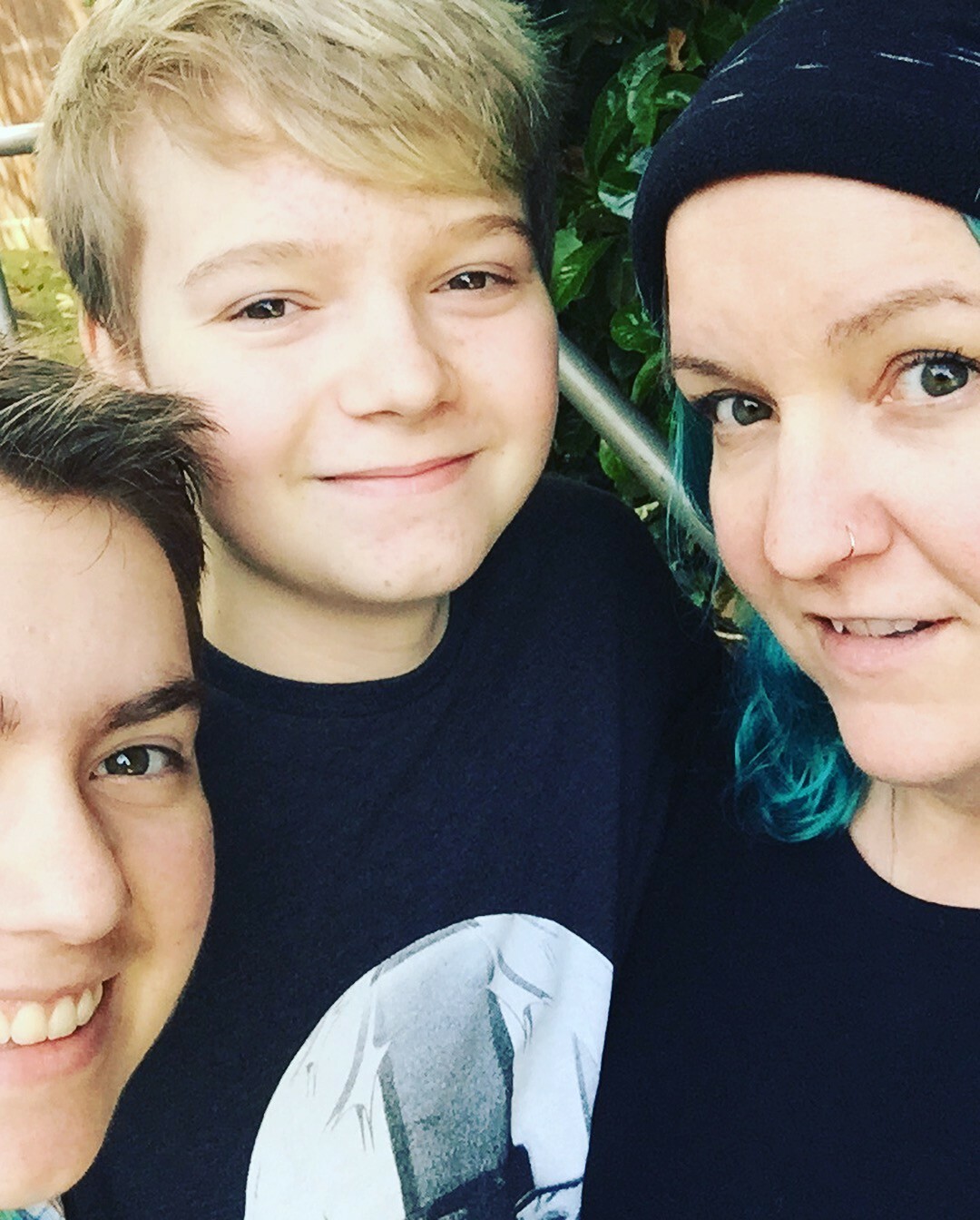
I've often thought I'd like to publish a short primer or zine for the many, many parents and carers who come to me for parenting advice - but who aren't ready to unschool. They see my results, they've watched my family and read my blog posts - sometimes for years! - and have become convinced we're on an amazing path. They want something different for their children - they want their kids happier, healthier, stronger, more free. They want their kids to have - as much as possible - a joyous, stable and productive future. They may even be ready to let go of the more controlling, authoritarian strategies they've been practicing.
But! many of them are not going to seriously step on the unschooling path. I can't count all the phone calls I've given where someone asked me a series of deep questions, listened intently to all our experiences, announced their intentions to follow suit - and then, ultimately, faded back into the more Mainstream Parenting gig alongside the vast, vast majority of American parents/carers.
Does this mean I have nothing to offer, no help to provide?
I don't think so.
So first: I am not the Unschooling Cops or the Primary Architect but when my partner and I say we are "radical unschoolers" this is what we mean:
We raised and continue to parent our kids with as much consent and freedom as possible, and we did not put them in school nor require curriculum at home. This means they were in charge of when they went to bed, what they ate, how many hours' of video games they played, the housework they did (or didn't do) - et cetera. (And yes, it works!)
When we do require our kids to do something, we do not pretend otherwise. We don't invoke fake- or mock-consent or pretend it's "for our child's good". We simply admit this is an issue that is, for now, non-negotiable. (As the years go on this "I'm making you do this" fades to absolute zero, and quickly too!)
If you'd like to delve deeper I will at this time direct you to some of Idzie's wonderful work on her blog I'm Unschooled, Yes I Can Write. This piece, "Unschooling 101", is a great starting point. I hope you save the page, then come back to read my thoughts.
***
Most non-unschoolers either can't understand me, don't really want to - or want to argue. I'm over it. At this point I wouldn't write about it at all if I didn't think we are doing our child class a tremendous disservice in this country. Personally, I think the by-rote gaslighting parents and teachers perform against children, is the worst harm we do to them. Because we destroy their self-concept, all the while asserting our moral right to do so, and our superiority as infallible or "well at least I meant well" autocrats. We then expect them to take up the mantle of adulthood and transform into keen-eyed, morally strong, self-assured warriors. It would be funny if it weren't so toxic!
As I predicted - but is still astonishingly breathtaking to watch unfold - as we raised our kids with these freedoms there were fewer and fewer conflicts. Our children are now 17 and 19 - an era where parents and teachers are constantly saying sour, crummy things about the teenage class - and our our house is one of hard work, creativity, harmony, and joy. Our kids are healthy, happy, have great peer relationships, and they are successful. They receive community and peer praise for their manners, maturity and deportment. We are at present four hardworking grownups living our best lives.
I have no fears for their skillsets in launching into adulthood. None.
My children have not had to live with what 99.9% of teenagers live with and I owe it to my readers and fans to share a little love.
For non-unschoolers, here are eight things I'd like to set straight:
Don't say you "unschool" if you're not unschooling.
As the word gains more traction, more trendiness, you're seeing more people say, "My kids go to school but we unschool on the weekends!" Again: I'm not the Word Police but if you really want to know what I think, I don't think you can honestly claim that title. You are pretending an experience and expertise you simply do not have, and you muddy the waters for those who might want to seriously give unschooling a try.Unschooling is good for all children, regardless.
Kids need (in this order, and if possible) a strong sense of safety, a nurturing and loving home, as much safe time with peers and in free play as possible, stability from the adults caring for them, "adulting" behaviors demonstrated with competency, and access - in safe and affirming settings - to the resources they need for their interests (which change quickly and often). These are universal needs regardless of socioeconomic class, ability, race, gender, et cetera. There are reasons not to unschool, but saying your child is "too special" or "too different" and therefore you "can't" unschool (or work towards unschooling) means you are not listening to me at all and at that point I'd rather you stopped reading because you won't be hearing anything I have to say.Authoritarian teaching and parenting hurts children, regardless.
Many adults go their whole lives unaware of how top-down, poisonous pedagogy, bully-pulpit our parenting and teaching strategies really are. Once you see this, you probably reflexively attempt to justify it all. But truly, authoritarian parenting and teaching have no merit. I understand why parents and teachers default to these positions - I am still recovering myself - but they are not warranted, productive, or scientifically-sound.
Neglect hurts children, regardless.
Anyone who knows me even a little knows my children are not neglected in any way. I am disturbed however to see that some parents pounce upon our family liberties and decide their own children don't need some of the things they really require: safety, stability, attention, clean clothing and nourishing food, regular adult involvement. While I don't think as a class unschooling parents are any more neglectful than those practicing mainstream principles (in fact I believe the opposite is true), I do think I wouldn't be doing my job if I weren't to firmly say say: neglect is real, and it is not excusable no matter what high-minded ideals we want to claim.
The older your child is, the harder it is to start unschooling.
It is not impossible to shift to unschooling at any stage of life - but for a child who's experienced years of compulsory schooling it takes more planning and more deliberation and bravery to unschool than if (like my family) you never started at all. Every day your child spends in compulsory attendance habituates them to the schooling environment which seeks above all other things to center and justify itself. It's possible (and preferable) to shift to unschooling from a traditional parenting schema, so never feel bad if you've got a late start. But the longer you've schooled the more deliberate and cautious you need to be. So on that note:
Don't destabilize your child.
For example - and yes, this example pertains to unschooling: if for years you've been dieting/fasting, engaging in orthorexic speech and behaviors, watching what your child eats, commenting on their food choices, making them "clean their plate", or bribing them with food (however carefully you may try to deny you are doing this), it can be tempting to suddenly be struck with fear and realize (correctly) that you may be setting them up for feeding and food issues - so then you want to lift all restrictions. This is usually self-serving, hasty, and can do great harm. To the extent you have habituated your child to this kind of oversight/over-control, you should be careful, deliberate, and measured in how you begin to untangle these problems. You should also - again, if possible - make sure the relevant adults in the child's life are going to work with you on these changes. Mainstream parenting and teaching behaviors - which center on rigor, control, and moral high ground - create an astonishingly complex pile-up of problems for the child who is routinely exposed to them; but all are able to be dismantled if you are committed to doing better. I strongly suggest you:
Consider mentorship.
I advise an unschooling mentor if you choose to move toward unschooling. Any strategies you use or discard should be considered carefully with regard to the family temperament, strengths, resources - et cetera. So for instance, the advice or suggestions I'd give a parent whose partner was unschooling-supportive, are very different than the ones I'd give a parent who had an unsupportive partner. Also: parents practice authoritarianism out of deep-seated beliefs and fears and it's very important to begin to understand what these are - because without this understanding, a mentor can't effectively work with a mentee. Thus a good mentor will always tell you to:
Seek to your own healing.
Don't shortcut your own unresolved traumas, bigotries and inner liabilities by simply trying to control your child. And don't pretend you aren't trying to control your child - when you are. If nothing else, I hope you can commit to that course of action as a bare-minimum starting place.
In answer to the question some of you have, no I do not provide coaching or mentorship (paid or unpaid) for those who want to unschool - at this time. I do take phone calls and share frankly, and offer support and advice if needed (you know how to find me). Two good resources for unschooling (and if you are serious, you will take the time to look them up): Idzie Desmarais' aforementioned body of work, and Akilah S. Richards' podcast, book, and projects.
